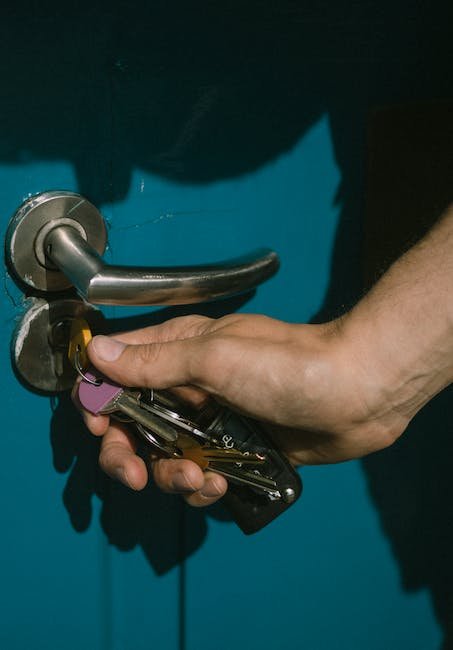Lockpicking is an art concealed in the shadows, studied and practiced by a select few who possess both the skill and the secrets of its manipulation. Society often views lockpickers as potential threats, whispering warnings of burglary and theft. However, what if we were to step into the enigmatic world of a lockpicker, not as a perpetrator, but as an advocate for security? In this article, we delve into a lockpicker’s mind to uncover the hidden vulnerabilities that exist in conventional security measures, as well as discover the ingenious strategies to safeguard our valuables through their unique perspective. Prepare to step behind the curtain and unlock the invaluable knowledge that lies within the realm of these secretive artisans.
Table of Contents
- Preventing the Path of Least Resistance: Evaluating Vulnerabilities in Security Systems
- Strengthening Your Fortress: Essential Strategies for Protecting Valuables
- Understanding the Tools of the Trade: Insights into Locking Mechanisms
- Lock it Down: Effective Techniques for Safeguarding Valuables
- Fortifying Your Defenses: Advanced Measures to Secure Your Belongings
- Q&A
- In Conclusion

Preventing the Path of Least Resistance: Evaluating Vulnerabilities in Security Systems
Vulnerabilities in security systems can pose a significant risk to individuals and organizations. In order to prevent these vulnerabilities from being exploited, it is essential to thoroughly evaluate and identify them. By doing so, we can ensure that our security systems are robust and capable of withstanding potential attacks.
One effective way to evaluate vulnerabilities is by conducting regular security audits. These audits involve a comprehensive analysis of the system’s architecture, design, and implementation. By scrutinizing each aspect, we can identify any weak points or potential loopholes that could be exploited by malicious actors.
During the evaluation process, it is important to consider various factors that contribute to vulnerabilities, such as outdated software, weak passwords, or insufficient access controls. Creating a checklist or using a vulnerability management tool can help ensure that no aspect is overlooked. Additionally, conducting penetration tests, where ethical hackers attempt to exploit the system’s vulnerabilities, can provide valuable insights into potential weaknesses.
Furthermore, implementing a robust patch management system is crucial in preventing vulnerabilities. Regularly updating software and firmware helps eliminate any known vulnerabilities that could be exploited. It is essential to stay informed about the latest security patches and promptly apply them to maintain the system’s integrity.
Key Steps for Evaluating Vulnerabilities:
- Perform regular security audits to identify potential weaknesses
- Consider factors such as outdated software, weak passwords, and insufficient access controls
- Conduct penetration tests to gain insights into potential vulnerabilities
- Implement a robust patch management system to eliminate known vulnerabilities
Preventing the path of least resistance requires a proactive and vigilant approach towards evaluating vulnerabilities in security systems. By staying ahead of potential threats and continuously strengthening our defenses, we can ensure the safety and integrity of our digital infrastructure.

Strengthening Your Fortress: Essential Strategies for Protecting Valuables
To safeguard your prized possessions and keep them out of harm’s way, fortifying your home is paramount. These essential strategies will guide you in protecting your valuables and ensuring peace of mind within the walls of your castle.
1. Investing in a High-Quality Security System:
- Equip your fortress with a cutting-edge security system that includes burglar alarms, motion sensors, and surveillance cameras.
- Connect your security system to a professional monitoring service for round-the-clock supervision and immediate response to any signs of intrusion.
- Place visible security signs and stickers around your home to deter potential thieves and intruders.
2. Reinforcing Doors and Windows:
- Install sturdy, solid-core doors and reinforce them with deadbolt locks for an added layer of defense.
- Add security film to windows to prevent shattering and make it more difficult for intruders to break in.
- Upgrade to burglar-resistant glass for windows in vulnerable areas of your home.
3. Creating Hidden Safes and Secret Compartments:
- Install inconspicuous wall safes or floor safes to keep your most valuable items away from prying eyes.
- Conceal small items in cleverly designed hidden compartments within furniture or behind inconspicuous panels.
- Consider using diversion safes, like books or household objects, to trick potential thieves into overlooking your hidden treasures.
By adopting these essential strategies, you will fortify your fortress and establish a secure haven for your cherished possessions. Remember, protecting your valuables is not just a task, but an art that demands creativity and perseverance.

Understanding the Tools of the Trade: Insights into Locking Mechanisms
Locking mechanisms have long been an intriguing enigma in the world of security. Their intricate design allows us to safeguard our possessions and ensure our privacy. Let’s take a closer look at some fascinating insights into the tools of the trade that make these mechanisms function and protect us from potential risks.
- Pin and Tumbler Locks: These locks, commonly found in residential and commercial settings, operate using a set of pins that must align perfectly in order to unlock the mechanism. Each pin consists of a driver and a key pin, varying in lengths. When the correct key is inserted, it aligns the pins at their shear line, enabling the cylinder to turn freely.
- Electronic Locks: Growing in popularity, electronic locks utilize cutting-edge technology to secure our belongings. These systems often rely on keycards, numeric codes, or biometric data like fingerprints or retina scans. By eliminating the need for physical keys, electronic locks offer convenience and enhanced security features.
- Combination Locks: Simple yet effective, combination locks have been used for centuries. With a rotating dial or multiple rotating wheels, users must enter a specific sequence of numbers or symbols to unlock the mechanism. The precision required in selecting the correct combination makes these locks a reliable choice for safeguarding valuables.
Understanding the intricacies of these locking mechanisms provides us with an insight into the craftsmanship and engineering that goes into ensuring our security. Whether it’s the traditional pin and tumbler locks, cutting-edge electronic systems, or the trusty combination locks, these tools of the trade continue to evolve and adapt to meet our ever-changing security needs.
Lock it Down: Effective Techniques for Safeguarding Valuables
In a world where theft and burglary have sadly become an everyday occurrence, it is crucial to take proactive measures to protect our valuables. Here are some tried and tested techniques that can help you ensure the safety of your prized possessions:
1. Invest in high-quality locks: The first line of defense against intruders is a sturdy lock. Choose a lock that is resistant to picking, tampering, and drilling. Consider opting for deadbolts, which provide an extra layer of security for your doors.
2. Use a hidden safe: Safes are not just for the movies; they are an effective way to protect your valuables at home. Select a safe that is fireproof, waterproof, and easily concealed. Camouflaging it within furniture or disguising it as an everyday object adds an extra level of security.
3. Install a security system: Modern technology has made it easier than ever to safeguard your home. Consider installing a security system that includes surveillance cameras, motion detectors, and alarms. This not only deters potential thieves but also provides evidence in case of a burglary.
4. Practice smart hiding: Avoid storing your valuables in the obvious spots, such as under the mattress or in the top drawer of your dresser. Instead, think outside the box. Utilize diversion safes that imitate common household items like books or cleaning products. Thieves are less likely to search for valuables in unexpected places.
5. Keep a detailed inventory: Create a comprehensive list of your valuables, including photographs and documentation of serial numbers. In case of theft, this inventory will be invaluable for insurance claims and recovery purposes.
Remember, prevention is key when it comes to safeguarding your valuables. By following these effective techniques, you can minimize the risk of theft and enjoy peace of mind knowing your prized possessions are safe and secure.
Fortifying Your Defenses: Advanced Measures to Secure Your Belongings
Invest in a Smart Security System
Premium security starts with investing in a cutting-edge smart security system. Combine motion detectors with HD cameras to cover all angles of your property. Advanced facial recognition technology and real-time alerts will provide an extra layer of protection. With the ability to control your security system remotely through a smartphone app, you’ll always be in control even when you’re miles away.
Upgrade Your Locks
Don’t underestimate the power of a secure lock. Consider upgrading your traditional lock to one that boasts anti-pick, anti-drill, and anti-bump features. For added security, consider installing digital locks that utilize biometrics or PIN codes. These modern locks safeguard against unauthorized entry and provide you with a peace of mind when it comes to securing your belongings.
Bolster Your Home’s Perimeter
Strengthen the fortification of your property by focusing on the perimeter. Install motion-sensor outdoor lights, making it harder for potential intruders to go unnoticed. Ensure your fence is sturdy and equip it with strategically placed barbed wire or a climbing deterrent. Consider planting thorny bushes near low windows to deter any trespassers. By fortifying the outer boundaries of your property, you create an additional barrier against unwanted access.
Remember: The best defense is a combination of advanced technology, intelligent planning, and enhancing physical barriers. By incorporating these advanced measures, you can significantly boost the security of your belongings, providing you with peace of mind and a more secure environment.
Q&A
Q: Are traditional locks effective in securing valuable items?
A: Traditional locks offer a basic level of security, but they can be easily bypassed by experienced lockpickers. Utilizing additional security measures and modern technology is recommended to enhance the protection of your valuables.
Q: How can I make my home more secure against lockpicking attempts?
A: Consider upgrading to high-security locks that incorporate features like mushroom pins or sidebar mechanisms. Additionally, bolstering your home’s overall security with alarm systems, surveillance cameras, and reinforced doors will act as deterrents for potential intruders.
Q: Are electronic locks a reliable alternative to traditional ones?
A: Electronic locks, especially those with advanced encryption algorithms, can provide a higher level of security compared to traditional locks. However, it’s essential to keep in mind that no lock is entirely foolproof, so maintaining regular firmware updates and strong password protection is crucial.
Q: Should I be concerned about bump keys and lock bumping?
A: Bump keys are a real concern as they can open many traditional pin and tumbler locks easily. However, using bump-resistant locks, which contain additional security features to deter bumping attempts, significantly reduces the risk of unauthorized access.
Q: Can I improve the security of my existing locks without replacing them?
A: Yes, you can reinforce your existing locks by adding security pins or upgrading the cylinders. Additionally, installing strike plates with longer screws and using accessories like door jammers or security bars can augment the overall security of your existing locking mechanisms.
Q: How important is it to hide or disguise valuable items?
A: Concealing valuable items can be a wise precautionary measure, as it reduces the chances of them being targeted if a potential intruder gains access to your home. Utilizing safes, hidden compartments, or even simple diversion tactics can create added layers of protection.
Q: What steps should I take if I suspect someone attempted to pick my locks?
A: If you believe someone tampered with your locks, it’s crucial to call the authorities and report the incident. Consider consulting a professional locksmith to assess the damage and recommend appropriate security upgrades to prevent future attempts.
In Conclusion
As we bring this lockpicker’s expedition to a close, we hope you have gained a valuable perspective on securing your prized possessions. Throughout our journey, we have ventured into the intricate world of locks and the crafty techniques and stealthy maneuvers that challenge their integrity.
Remember, dear reader, that our intent has always been to shed light on vulnerabilities, empowering you to protect your valuables more effectively. The art of lockpicking, when embraced ethically, serves as a reminder that knowledge can be a formidable ally in the pursuit of security.
As our fingers danced delicately over tumblers and our minds waded through a sea of intricacies, it became evident that securing our valuables extends beyond mere mechanical barriers. It requires a holistic approach that combines elements of physical fortification, situational awareness, and an unwavering commitment to safeguarding what we hold dear.
From installing robust locks like fortresses guarding against unwanted intrusions to utilizing cutting-edge security technology, you now possess the tools to build an impenetrable fortress around your cherished belongings. Additionally, don’t underestimate the power of a well-lit exterior, vigilant neighbors, and the strength of a community united against theft.
While our focus may have traversed from the shadows of the craft to the sunny land of security, we remind you that knowledge carries great responsibility. The ethical usage of lockpicking knowledge is imperative. With great power comes the moral duty to protect, not exploit.
So, as we conclude this expedition through the labyrinth of locks, tumblers, and security mechanisms, take a moment to reflect on the valuable lessons learned. Embrace the opportunity to augment your security measures, bolstered by an understanding of how vulnerabilities lie hidden beneath the surface.
In the end, dear reader, it is not just about securing our treasures physically. It is about nurturing a mindset where protection becomes an ingrained part of our lives. It is about appreciating the intricate dance between locks and lockpickers, ultimately sculpting a world where possessions are cherished, guarded, and preserved.
Let this journey serve as a reminder that every intricate mechanism invites a unique challenge, and it is our duty to rise above it. With the right knowledge, respect for security, and an unwavering commitment, we stand poised to imbue our lives with a shield of protection that can weather any storm.
So go forth, dear reader, with newfound awareness and an unyielding determination to secure your valuables. And remember, it is not just the lockpicker’s perspective that matters, but the collective effort of an informed and empowered community that truly makes a difference.
As an affiliate, my content may feature links to products I personally use and recommend. By taking action, like subscribing or making a purchase, you’ll be supporting my work and fueling my taco cravings at the same time. Win-win, right?
Want to read more? Check out our Affiliate Disclosure page.